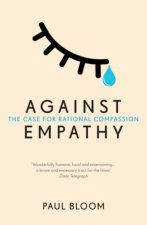
Kód: 04117460
Humanity
Autor Jonathan Glover
This book is about history and morality in the twentieth century. It is about the psychology which made possible Hiroshima, the Nazi genocide, the Gulag, the Chinese Cultural Revolution, Pol Pot's Cambodia, Rwanda, Bosnia and many ... celý popis
- Jazyk:
 Angličtina
Angličtina - Vazba: Brožovaná
- Počet stran: 480
Nakladatelství: Vintage Publishing, 2001
- Více informací o knize

675 Kč
Dostupnost:
50 % šance Máme informaci, že by titul mohl být dostupný. Na základě vaší objednávky se ho pokusíme do 6 týdnů zajistit.
Máme informaci, že by titul mohl být dostupný. Na základě vaší objednávky se ho pokusíme do 6 týdnů zajistit.Prohledáme celý svět
Mohlo by se vám také líbit
-

A Handbook of Critical Approaches to Literature
4344 Kč -

Causing Death and Saving Lives
356 Kč -

Man's Search For Meaning
323 Kč -

Pathological Altruism
2930 Kč -

Fascism
559 Kč -

Everybody Lies
303 Kč -

On Bullshit
255 Kč -

But Seriously
303 Kč -

Magical Techniques
524 Kč -

Stand Firm - Resisting the Self-Improvement Craze
505 Kč -

Hubble's Universe: 2nd Ed; Greatest Discoveries and Latest Images
813 Kč -

Modernism and Fascism
5157 Kč -

Vought F4U Corsair
410 Kč -

Shadow of the Tomb Raider The Official Art Book
916 Kč -

Humankind
306 Kč -

Edison
465 Kč -

Bootstrapping Microservices with Docker, Kubernetes, and Terraform
1334 Kč -

Lover's Eyes: Eye Miniatures from the Skier Collection
1404 Kč -

Humankind
290 Kč -

Court
476 Kč -

Welcome Home
463 Kč -

Milk & Mocha Comics Collection
424 Kč -

Man Alone with Himself
185 Kč -

Antifragile
268 Kč -

Fire Study
191 Kč -

Sankarea Vol. 5
322 Kč -

General Chemistry
825 Kč -

How Enlightenment Changes Your Brain
464 Kč -

Most Good You Can Do
416 Kč -

Pride and Prejudice and Zombies
276 Kč -

Dictionary of Accounting
383 Kč -

Jim Morrison
517 Kč -

Jane Eyre
250 Kč -

Hieronymus Bosch
618 Kč -

Dog Frisbee
299 Kč -

Magie zabíjí
253 Kč -

Velký Závod Dobrodružství Rychlé Veverky
150 Kč -

Proroctví
980 Kč -

Alisik
173 Kč -

LOS AÑOS 60
902 Kč -

Immer fröhlich mit Bobo Siebenschläfer
249 Kč -

Claude na vidieku
127 Kč
Darujte tuto knihu ještě dnes
- Objednejte knihu a zvolte Zaslat jako dárek.
- Obratem obdržíte darovací poukaz na knihu, který můžete ihned předat obdarovanému.
- Knihu zašleme na adresu obdarovaného, o nic se nestaráte.
Informovat o naskladnění knihy
Zadejte do formuláře e-mailovou adresu a jakmile knihu naskladníme, zašleme vám o tom zprávu. Pohlídáme vše za vás.
Více informací o knize Humanity
Nákupem získáte 68 bodů
 Anotace knihy
Anotace knihy
This book is about history and morality in the twentieth century. It is about the psychology which made possible Hiroshima, the Nazi genocide, the Gulag, the Chinese Cultural Revolution, Pol Pot's Cambodia, Rwanda, Bosnia and many other atrocities. In modern technological war, victims are distant and responsibility is fragmented. The scientists making the atomic bomb thought that they were only providing a weapon: how it was used was to be the responsibility of society. The people who dropped the bomb were only obeying orders. The machinery of the political decision-taking was so complex that no one among the politicians was unambiguously responsible. No one thought of themselves as causing the horrors of Hiroshima. Jonathan Glover examines tribalism: how, in Rwanda and in the former Yugoslavia, people who once lived together became trapped into mutual fear and hatred. He investigates how, in Stalin's Russia, Mao's China and in Cambodia, systems of belief made atrocities possible. The analysis of Nazism explores the emotionally powerful combination of tribalism and belief which enabled people to commit acts otherwise unimaginable. Drawing on accounts of participants, victims and observers, Jonathan Glover shows that different atrocities have common patterns which suggest weak points in our psychology. The resulting picture is used as a guide for the ethics we should create if we hope to overcome them. The message is not one of pessimism or despair: only by looking closely at the monsters inside us can we undertake the project of caging and taming them.
 Parametry knihy
Parametry knihy
Zařazení knihy Knihy v angličtině Humanities Philosophy Ethics & moral philosophy
675 Kč
- Plný název: Humanity
- Autor: Jonathan Glover
- Jazyk:
 Angličtina
Angličtina - Vazba: Brožovaná
- Počet stran: 480
- EAN: 9780712665414
- ISBN: 0712665412
- ID: 04117460
- Nakladatelství: Vintage Publishing
- Hmotnost: 582 g
- Rozměry: 231 × 156 × 37 mm
- Datum vydání: 04. January 2001
Oblíbené z jiného soudku
-

Wholeness and the Implicate Order
573 Kč -

Moral Landscape
323 Kč -

On Human Nature
356 Kč -

Beyond Good and Evil
329 Kč -

Lying
365 Kč -

Beyond Good and Evil
223 Kč -

Skin in the Game
323 Kč -

The Genealogy of Morals
127 Kč -

After Virtue
699 Kč -

Doing Good Better
303 Kč -

Civil Disobedience and Other Essays
89 Kč -

Ethics
365 Kč -

Parmenides
256 Kč -

Responsibility and Judgment
420 Kč -

Usefulness of Useless Knowledge
249 Kč -

Apology, Crito and Phaedo of Socrates
256 Kč -

Matters of Care
887 Kč -

Beyond Good and Evil
375 Kč -

Principia Ethica
284 Kč -

On Friendship
738 Kč -

Integrity
580 Kč -

Freedom as a Value
773 Kč -

Meditations
252 Kč -

Against Empathy
323 Kč -

Theory of Moral Sentiments
410 Kč -

What We Owe to Each Other
917 Kč -

On Truth and Untruth
249 Kč -

Better Never to Have Been
1140 Kč -

Reasons and Persons
821 Kč -

Inventing the Individual
304 Kč -

Beyond Freedom and Dignity
574 Kč -

Precipice
617 Kč -

A Confession
196 Kč -

What Money Can't Buy
302 Kč -

Will to Power
276 Kč -

Ethics in the Real World
501 Kč -

Justice
454 Kč -

On Human Nature
716 Kč -

Protagoras
718 Kč -

Oxford Handbook of Business Ethics
1918 Kč -

Human Life, Action and Ethics
605 Kč -

Getting Back into Place, Second Edition
861 Kč -

New Approach to Utilitarianism
1665 Kč -

Evidential Argument from Evil
810 Kč -

Oxford Studies in Metaethics 11
1425 Kč -

Why It's OK to Want to Be Rich
708 Kč -

Moral Theory - A Non-Consequentialist Approach
1893 Kč -

Radical Sacrifice
372 Kč -

Applied Ethics
1893 Kč
Osobní odběr Praha, Brno a 12903 dalších
Copyright ©2008-24 nejlevnejsi-knihy.cz Všechna práva vyhrazenaSoukromíCookies


 Vrácení do měsíce
Vrácení do měsíce 571 999 099 (8-15.30h)
571 999 099 (8-15.30h)